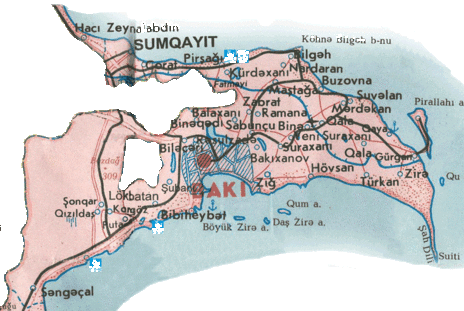End of an epoch – dismantling Baku’s suburban railways

Photo from Aztelekom.org
Starting on 12 August, Azerbaijani transportation authorities have begun to dismantle Baku’s celebrated, but rapidly degrading suburban railway system, which was founded by famous Swedish family of the Nobels and went through several major overhauls in its history.
Constructed between 1878 and 1880, a short private railway line started to carry petrol between a district of oil fields and a district of oil refineries in suburbs of Baku. But, it was from this small line that new railroads extended to Tbilisi and Batumi (1883) and connected Caucasus to the railway network of the Russian Empire (1900). In 1926, the first decade of the Soviet rule, Baku’s suburban railway became the first line to be electrified in whole Union.
Construction of new lines and reconstruction works of 1930s were disrupted by the outbreak of the Second World War, but at the end of it, with a major boost of a workforce of German war prisoners, the railways got a major overhaul. The commission of new lines in 1950 effectively turned Baku’s suburban railways into the Absheron Circular Railroad, which covered almost all suburban settlements in central parts of Absheron peninsula. In late 1950s, three offshoots of the Circular Railroad connected both western and eastern parts of the peninsula to the existing network.
The railway quickly became celebrated, both for its vast coverage and easiness to reach. It was the way through which hundreds from nearby villages commuted to industrial Baku every day, and through which hundreds of Baku residents traveled to their suburban dachas and beaches in northern Absheron in weekends and summers. And the railway stations themselves, built in best forms and practices of Stalin empire were considered chef d’oeuvres of local architecture.
However, since the second oil boom reached post-soviet, independent Azerbaijan, paradoxally, state of public transportation has been in constant decline. Long neglected and underfunded, both tram and trolleybus networks of Baku were quickly dismantled leaving the streets and roads for motor cars only. Now, it seems that what the first oil boom of XIX-XX centuries has built – Baku’s suburban railways – will fall victim to the second oil boom. The Government is already planning to build new highways instead of dismantled railways.
In the same time, hundreds, maybe thousands are trapped in what can be effectively called the disruption of the public transportation as well as a destruction of a heritage – residents of several suburban settlements, including the biggest one – Mashtagha, are not only deprived of their easiest way of commuting, but their travel expenses have risen ten-to-twenty fold. Besides, residents of such remotest settlements as Albaliliq (former Vyshnyovka) had and have no alternative than walking kilometers to a nearest bus stop in a nearest town.
I remember when we used to have a dacha in Albaliliq, how we were solving our transport problems – my father was just stopping trains for us – trains running in the Absheron Circular Railroad. And here it is, my memory from childhood, and if you are a true Bakuvian, you can even cry.
"To see your city destroyed before your own eyes is not a pain that can be described and put to words. It turns you sour or was that bitter, it makes something snap in you and you lose whatever hope you had." – Salam Pax once wrote about Baghdad for other circumstances, but I continue to recall it constantly these days – "Undone by your own hands. Close your doors. Shut your eyes. Hope the black clouds of this ugliness do not reach you."
